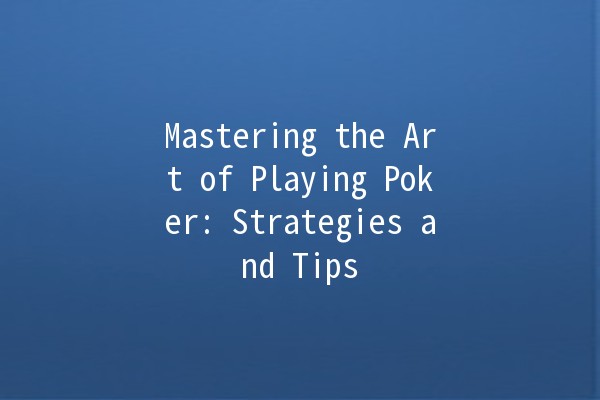Poker, a game of skill, strategy, and psychological insight, attracts players from all walks of life. Whether you're a newcomer looking to learn the basics or a seasoned player seeking to refine your strategies, this article delves into essential techniques and insights that can elevate your poker game. Here, we provide practical advice to enhance your experience and boost your chances of winning.
Understanding the Basics of Poker
Before diving into advanced strategies, it's crucial to familiarize yourself with the fundamental rules and gameplay of poker. The game typically involves a standard 52card deck and can accommodate 2 to 10 players at a table. The objective is to win chips by either having the highestranking hand at showdown or convincing your opponents to fold.

Key Poker Terms:
Blinds: Forced bets made by the two players to the left of the dealer.
Flop, Turn, and River: The community cards dealt face up in the center of the table, which are shared by all players.
Showdown: The phase when players reveal their hands to determine the winner.
Familiarity with these terms lays a solid foundation for understanding how to play poker effectively.
5 Essential Tips to Elevate Your Poker Game
Understanding Starting Hands: One of the most critical aspects of poker is deciding which hands to play. While it may be tempting to play every hand, good players know that starting hand selection is vital for longterm success.
Practical Application: Focus on premium hands like pairs of Aces or Kings, or high cards like AceKing. If you're playing Texas Hold'em, screen your starting hands based on your position at the table. For example, in early positions, lean towards stronger hands, while in late positions, you can expand your range since you've observed your opponents’ actions.
The Importance of Table Position: Your position at the poker table determines the order of betting and can significantly influence your strategy. Players in late positions can use the information gathered from previous players to make more informed decisions.
Practical Application: If you are in the cutoff position or on the button, consider playing a wider range of hands, leveraging your position to steal blinds or apply pressure on opponents. Conversely, in early positions, play conservatively and only commit to strong hands.
Understanding Bluffing: Bluffing is an essential component of poker that adds a layer of complexity to the game. A successful bluff can win you a pot you might otherwise lose.
Practical Application: Choose your moments wisely. A good bluffing opportunity arises when the board texture suggests a strong potential hand. For instance, if you've been playing tight and suddenly bet heavily on a connected board, your opponents may believe you have a strong hand and fold weaker holdings.
Observation as a Strategy: One of the most overlooked aspects of poker is observing opponents’ behaviors, bet patterns, and tendencies.
Practical Application: Take notes on how players respond to various situations. Are they aggressive? Do they fold often when facing raises? Use this insight to shape your strategy against them. For example, if a player tends to bluff frequently, consider calling them down with marginal hands to catch them out.
Understanding Bankroll Management: Effective bankroll management helps mitigate risks and ensures longevity in poker. It dictates how much money you can comfortably afford to play with and when to walk away.
Practical Application: Establish a budget for your poker expenses and stick to it. A common rule is to only risk 12% of your total bankroll in a single game or tournament to ensure that a bad run of cards does not deplete your funds.
Common Misconceptions About Poker
Is Poker Just a Game of Luck?
While luck plays a role in the short term, poker is primarily a skillbased game. Over many hands, skillful players outperform those relying solely on luck.
Can Anyone Become a Poker Pro?
Yes! With dedication, practice, and a willingness to learn and adapt, anyone can develop their poker skills. It requires understanding the game, refining strategies, and being disciplined.
How Important is Reading Opponents?
Reading opponents is vital. Understanding their tendencies and adapting your strategy accordingly can significantly increase your chances of success.
Frequently Asked Questions
How can I improve my poker skills?
Improving your poker skills requires practice and a willingness to learn. Consider applying the tips outlined above, reviewing hand histories, and engaging in discussions with other players. Joining online forums or taking poker courses can also provide valuable insights.
Should I play aggressively all the time?
Playing aggressively can yield rewards, but it’s crucial to strike a balance. Understanding your position, the strength of your hand, and your opponents’ tendencies will dictate your approach.
What are the best resources for learning poker strategies?
Numerous resources include books by professional players, online poker courses, and quality articles covering various aspects of the game. Websites dedicated to poker strategy are also beneficial.
How do I handle variance in poker?
Variance is a natural aspect of poker. Accepting that losing streaks will happen can help maintain a healthy mindset. Focus on improving your game and making sound decisions rather than fixating on shortterm results.
What is the importance of emotional control in poker?
Emotional control, or maintaining a "poker face," is essential. Allowing emotions to dictate your gameplay can lead to poor decisionmaking. Practice techniques such as mindfulness to enhance your emotional resilience.
Can playing online poker help improve my skills?
Absolutely! Online poker offers a platform to practice against a wide range of opponents, often at lower stakes. The ability to play multiple tables simultaneously also accelerates your learning curve.
By implementing these strategies and honing your skills, you'll be well on your way to becoming a formidable poker player. Embrace the journey, and remember that patience and persistence are key in the pursuit of poker mastery.